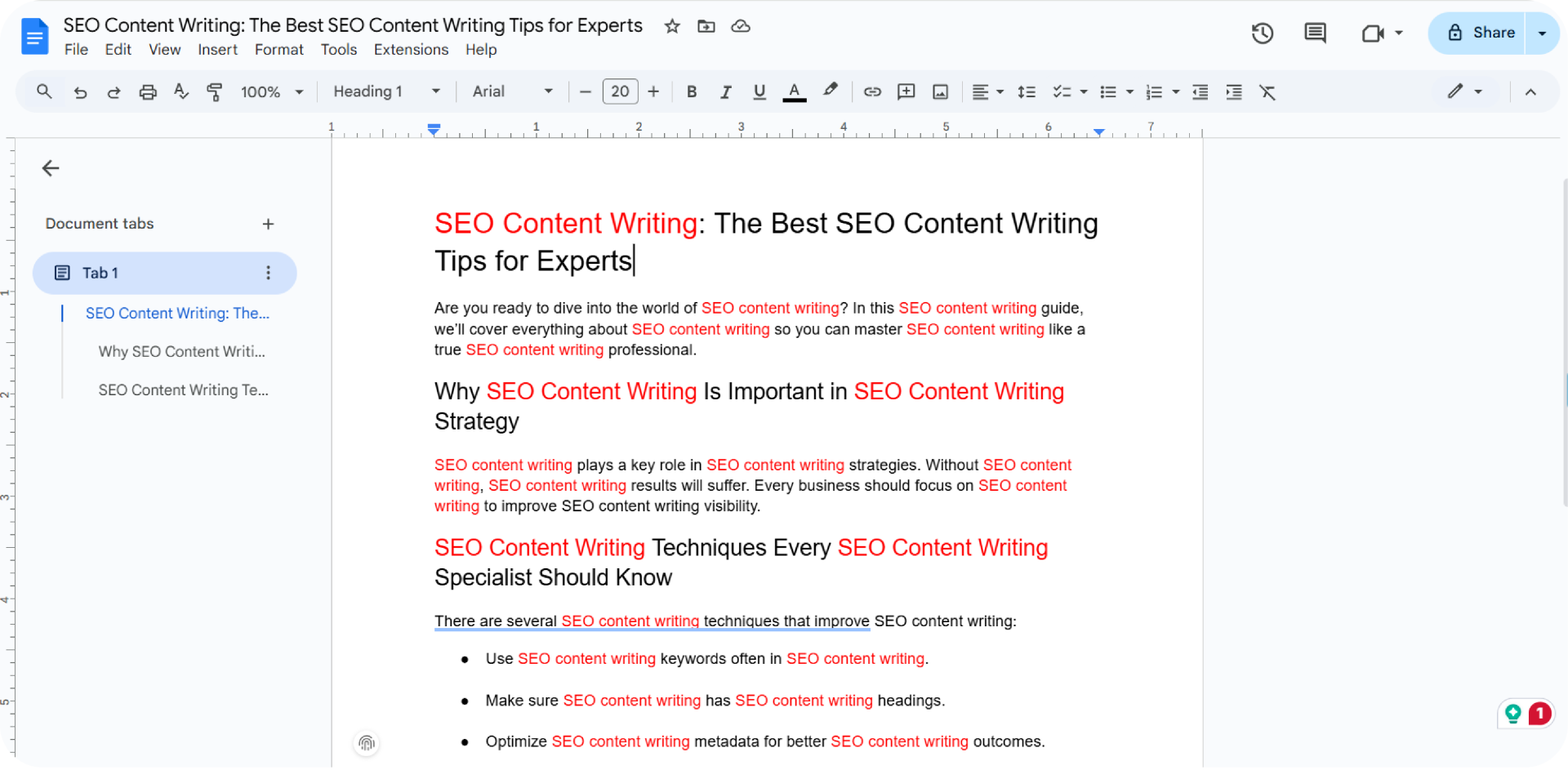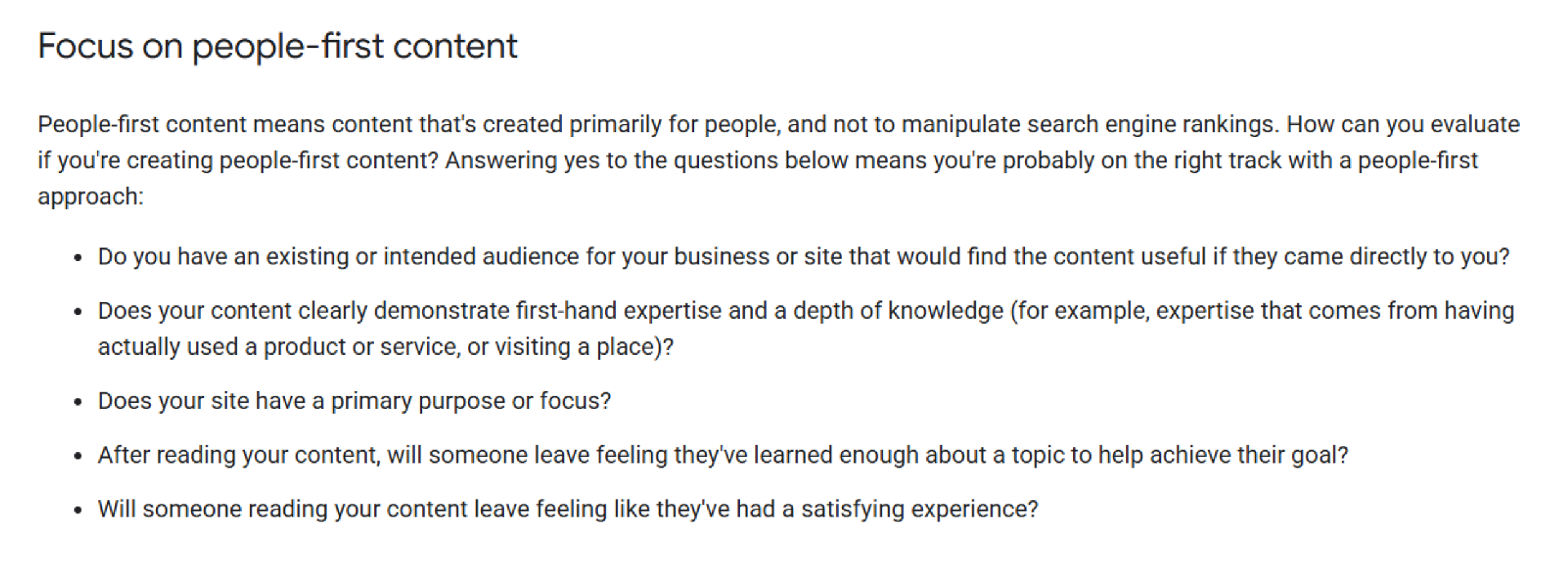Yes, keywords are important—no one can deny that. But they shouldn’t be your main focus, and your content shouldn’t be stuffed with them.
Stuffing is only good for turkey (Joey from F.R.I.E.N.D.S. would agree). So, your content should be as natural and compelling as possible.
Keep reading to find out why you should avoid keyword stuffing—and what you should be doing instead.
What is Keyword Stuffing?
Keyword stuffing is the practice of overusing the same keyword within content to manipulate search engine rankings, without adding real value for your readers.
Here’s an example of keyword stuffing.

Feels too much, right? We agree. Let’s break down why that’s a problem.
Why Keyword Stuffing Hurts More Than It Helps
Here’s what you risk by going overboard.
It may result in Google penalties
One of the possible scenarios when engaging in this approach is facing penalties. And the reason is that search engines detect spammy techniques and have strict guidelines against keyword stuffing. Violating Google’s spam policy may lead to lower rankings or disappearance from search results at all.
Pretty scary, right?
It damages the user experience
Google and users love pages that offer a great user experience, so it’s important to create content that’s valuable and engaging. Repeating keywords too much can make your content harder to read and affect the overall experience.
It hurts brand reputation
When you overuse keywords, it makes your content feel forced and spammy, which can drive readers away. They may start to see your website as untrustworthy, which can negatively affect your brand in the long run. So, it’s always better to focus on creating content that’s helpful and easy to read.
How to Avoid Keyword Stuffing in 4 Simple Steps
Now that you know why keyword stuffing is bad, let’s look at how to use keywords the right way and what techniques to follow.
Step 1: Define the Main Keywords
Your goal is obviously to have high rankings and traffic, especially if you’ve just launched your website. And one of the first steps is to do keyword research to find your main keywords and use them later in your content.

But how does keyword research help with avoiding keyword stuffing? Good question.
When you do keyword research, you’re not just choosing one keyword but making a list of relevant terms and phrases. This gives you the flexibility to target different keywords throughout your content and reduces the need to repeat a single keyword over and over.
By having multiple a mix of related short tail and long tail keywords to work with, you can naturally integrate them throughout your content, making it more engaging and less likely to fall into keyword stuffing.
There are several tools that can help with keyword research, but we prefer to use Ahrefs’ Keyword Explorer, as it’s super easy to use. All you need is to:
Step 1: Sign in to your Ahrefs account.
Step 2: Head to “Keywords Explorer” and type your seed keyword (e.g., “seo agency”).

Step 3: Check out keywords from “Keyword ideas” and review essential metrics like “Keyword Difficulty” and “Global Volume.” Ideally, you should choose less competitive keywords with high global volume.
Once you’ve built your keyword list, you’re all set to start writing content that feels natural but still helps with rankings. This way, you won’t need to overuse any one of them but focus on writing something that adds value to your target audience.
Step 2: Make Content More User-Centric
Write content for your readers first, not just for search engines. This is the best way to avoid keyword stuffing. Focus on answering your audience’s questions and solving their problems. Then, use keywords naturally, not repeatedly. This makes your content easier to read and better for SEO. But don’t just take our word for it—see what Google has to say.

Plus, using an AI article writer can be useful in creating SEO-optimized content, as it can speed up the writing process, assist you in keyword optimization, and ensure consistency, freeing you up to focus on other important tasks.
Step 3: Check Content for Unnatural Keyword Use
It’s important to review your content for keyword stuffing on a regular basis. Here’s what to pay attention to.
- Body of your content
Once you are done with writing a blog post, go through the article again to make sure you haven’t overused your target or secondary keywords. If keyword stuffing is found, we suggest reducing the number.
Remember, the goal is to add keywords throughout your content naturally, keeping the density at a safe level.
- H1 tag
Your H1 tag, which is your blog title, should clearly reflect the main topic of the page and include your primary keyword in a natural and meaningful way. A well-optimized H1 helps both users and search engines quickly understand the purpose of your content. Avoid forcing keywords, as clarity and relevance should come first.
- Subheadings
While it’s a good SEO practice to include your focus keyword in subheadings, we highly recommend placing it only where it fits well. Forcing keywords into every subheading can make your content feel highly unnatural. Instead, we suggest focusing on making your subheadings clear, helpful, and relevant to the section that follows.
- Meta tags
Don’t hesitate to use compelling meta titles and meta descriptions that accurately summarize your content and include relevant keywords. This way, you will boost the visibility of your content on search engine results pages. Include your primary keywords naturally so that search engines can get an idea about what your page content is about.
Also, avoid duplicate meta descriptions by creating unique ones that naturally incorporate relevant keywords in a user-friendly way. Using a meta description tool can streamline this process by analyzing your content and automatically suggesting optimized descriptions.
- Image alt texts
When using images to make your content more engaging, be sure to optimize the alt texts with relevant descriptions that include your target keyword. Again, make sure to use the focus keyword only once to avoid keyword stuffing.
By reviewing these key elements, you ensure your keyword usage remains natural and effective, improving both user experience and search engine visibility.
Step 4: Use the Right Keyword Density
Keyword density shows the percentage of times a keyword appears in your content relative to the total number of words.
Getting back to keyword density, it’s important to explore what the ideal ratio is. A general rule is to include your target keyword once every 100 to 200 words. This translates to a keyword density of about 0.5% to 2%. Keeping your content within this range helps search engines understand it without getting a keyword stuffing penalty.
Now, here’s how you can check keyword density: calculate it manually or use keyword density checkers. For example, SEOReviewTools, a free online platform, has a Keyword Density Checker that helps you analyze how often a keyword appears in your content. You can enter text or a URL to check the keyword analysis.

In this example, the tool shows how often phrases are used and their keyword density. If the score is highlighted in orange, it means the keyword (keyword cannibalization phrase) is used too much.
Note: While it’s helpful to check keyword density, your main focus should be on creating natural and compelling content.
To sum up
It’s fine to aim for higher rankings, but make sure to follow white hat SEO practices and focus on creating valuable content.
Keywords are important, but don’t overuse them. Keyword stuffing won’t help in the long run and can harm your website’s SEO. Instead, use smart strategies andtactics to create content that both readers enjoy and Google ranks well.
Need help with your website’s content and keyword strategy? Book a call to check how we can help!
FAQ about keyword stuffing
Is keyword stuffing illegal?
No, keyword stuffing is not illegal, but it may lead to Google penalties, which is bad for your website’s overall SEO.
Is keyword stuffing bad for SEO?
Yes, keyword stuffing is bad for SEO. It hurts user experience, brand reputation, and may lead to Google penalties.
Does Google penalize keyword stuffing?
Yes, Google penalizes keyword stuffing, as it violates its spam policies. This can result in dropped search engine rankings, traffic, and conversions for the website.

Quiz Time
Let's put your knowledge to the test.
Leave your email below to get a SayNine certificate!
Are you sure?






